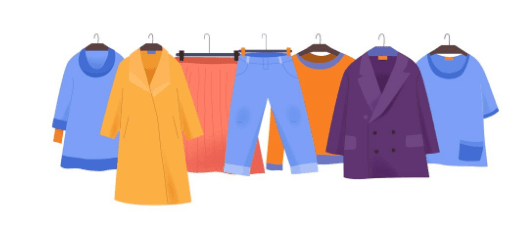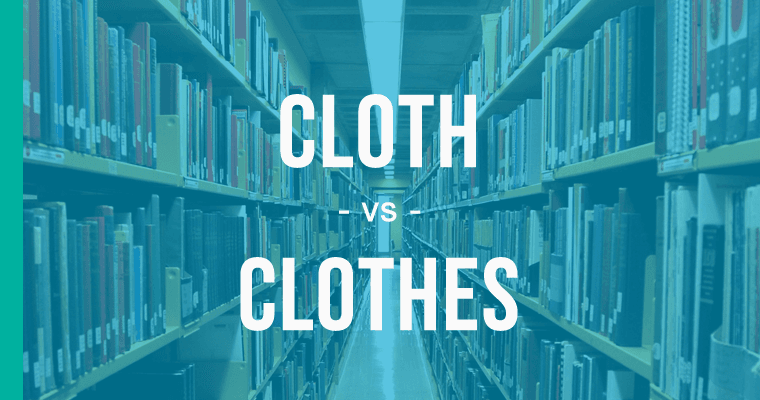Fabric or Fashion: A Comprehensive Look at Cloth Vs Clothes
Contents

A common confusion among non-native English learners in India is the usage of "cloth" and "clothes". Though similar in spelling and pronunciation, these two terms have distinct meanings and usages, creating a stumbling block for many. This blog post aims to dissolve that confusion, offering an accessible guide to differentiate between ‘cloth’ and ‘clothes’.
We'll provide a detailed exploration of each term, their specific usages, commonly made errors, and best practices to avoid these mistakes. Get ready to dive deep into practical scenarios and relatable examples that will illuminate the mystery surrounding these two words.
What are 'Cloth' and 'Clothes'?
The English language is peppered with nuances, making it a beautiful yet challenging language to master. One such example is the difference between 'cloth' and 'clothes'. Both these words may sound similar, especially in the Indian context, thus leading to confusion as their meanings differ substantially.
Let's start by defining 'cloth'. This term refers to any material made by weaving, knitting, crocheting or bonding that we use to make clothes, curtains, or coverings for furniture. For example, in India, cotton cloth is used to make kurtas and sarees.
Now let's move on to 'clothes'. This term refers to garments that people wear. They can be made of cloth but also other materials like leather or silk. An example could be: "I bought new clothes for Diwali", meaning you bought new garments/outfits for the festival.
A common misconception amongst English learners in India is using these terms interchangeably due to their similar cloth vs clothes pronunciation. However, remember - 'cloth' is the material, while 'clothes' are what we wear.
How to Pronounce 'Cloth' and 'Clothes'?

What's intriguing is that pronunciation plays a key role in distinguishing these two terms. The difference lies in how we pronounce the end – with 'cloth' ending in a hard 'th' sound, while 'clothes' ends with a soft 'z' sound.
Understanding the pronunciation difference between 'cloth' and 'clothes' is important for non-native English speakers.
Cloth: Pronounced as /klɒθ/, the word 'cloth' rhymes with 'moth'. Practice saying it aloud until you are comfortable.
Clothes: The word should be pronounced /kləʊðz/ where the ‘th’ sounds like ‘the’ and ends with a ‘z’ sound. It's similar to saying "close" but with a slight ‘th’ sound in the middle.
Common Mistakes in Using 'Cloth' and 'Clothes'
Let's dive into some of the common mistakes made by Indian English speakers when using the terms 'cloth' and 'clothes':
1. Incorrect scenario:
A: "Ajay, do you have any spare cloth in your wardrobe?"
B: "Yes, Rekha. I have a few cloth."
Correct scenario:
A: "Ajay, do you have any spare clothes in your wardrobe?"
B: "Yes, Rekha. I have a few clothes."
2. Incorrect scenario:
A: "I bought a beautiful clothes today."
B: "Really? What kind of cloths did you get?"
Correct scenario:
A: "I bought some beautiful clothes today."
B: "Really? What kind of clothes did you get?"
Tips for Correct Usage and Pronunciation
1. Understand the difference:
Remember, 'cloth' refers to any piece of fabric or material, while 'clothes' refers to garments or items of clothing. Understanding this distinction is key to using these terms correctly. For example, you might buy a piece of cloth to stitch into a shirt, but once stitched, it becomes your clothes.
2. Correct pronunciation:
The pronunciation of both words can be tricky due to the 'th' sound. Spend time practicing these sounds aloud. Repeat after native English speakers or use online pronunciation guides.
3. Seek Professional Help:
Sometimes guidance from professionals can make language learning much easier and faster. For more help with pronunciation, refer to Clapingo's blog posts and short videos with pronunciation and vocabulary tips.
4. Practice regularly:
Practice makes perfect! Regularly speaking out loud using both words will help you become more fluent and confident in their usage and pronunciation.
Clapingo's Role in Overcoming these Challenges
At Clapingo, we recognise that language learning is a journey, and every journey needs a guide. Our personalised coaching offers a map through the maze of English language learning, particularly the nuances like the difference between 'cloth' vs 'clothes' pronunciation (among other such challenges).
Our native English speakers, your personal coaches, have an ear for phonetics and can provide detailed feedback on pronunciation and usage. They can help you distinguish between similar-sounding words and phrases, ensuring you feel confident while speaking English.
If you're looking to boost your spoken English skills, consider our comprehensive services. Book a quick demo here.
To Sum Up
In our exploration of 'cloth' versus 'clothes', we've unraveled that 'cloth' generally refers to a material used for making things, whereas 'clothes' refer to garments that we wear.
Understanding these nuances and their proper pronunciation is crucial, especially within the professional sphere in India. Consider practicing more real-life scenarios in English.
And remember, Clapingo is always here to help you climb this mountain. Their one-on-one coaching sessions provide personalized learning experiences tailored to meet your specific language needs.
FAQs
1. Can I use 'cloth' and 'clothes' interchangeably?
No, you cannot use 'cloth' and 'clothes' interchangeably. Using these words incorrectly can lead to confusion in communication. Remember, while you might buy some cloth to make a dress, once that dress is made, it becomes part of your clothes.
2. When should I use 'cloth' vs 'clothes'?
You should use 'cloth' when talking about fabric or material from which products are made. It's commonly used in contexts related to crafting or sewing. Conversely, use 'clothes' when you are referring to garments or attire that you wear.
3. Is there any difference in pronunciation between 'cloth' and 'clothes'?
Yes, there is a slight variation in the cloth vs clothes pronunciation. While both words begin with the same sound, 'cloth' ends with the /θ/ sound (as in ‘think’), and 'clothes' ends with the /ðz/ sound (like ‘those’). If you need help with pronunciation, Clapingo offers personalized coaching sessions where native English speakers can guide you.
Comments
Your comment has been submitted